Are men or women more delusional in how hot they think they are? Let’s find out!
The actual purpose of my survey was different - I really wanted to know: what method of asking someone how hot they are, generates the most accurate results?
You could:
ask people to rate themselves on a 1-10 scale of hotness
give them photos of people of their same gender - photos that I’ve already had a whole bunch of other people rate, so I know what photo is equivalent to what rating - and ask people to compare their own hotness against those photos
do the same thing again, but instead of asking them to compare their hotness to people of their own gender, give them people of the opposite gender and ask “who’s out of your league?” You could infer if a man looks at a photo of a supermodel rated 8/10 and says “Yeah she’s in my league”, but everyone else rates a photo of that man as 3/10, that there might be a bit of an inaccuracy going on there.
In order to test this I had to get people to give me their photos, and then have them self-assess according to the above three metrics. Then, I had to get other people to rate those photos, and see which of the three methods gave ratings that most matched other people’s ratings.
But photos can lie. What if people submitted way more flattering photos than how they look in real life? To try to get around this a bit, I asked people to submit two photos - one average, and one looking your best. I figured maybe if I explicitly asked for the best photo, that would let people get it out of their system, and they’d be a little more honest when submitting an average photo.
There. That’s the basic survey design. But the true friends are the unintended graphs we discovered along the way.
Keep in mind I didn’t design my survey with the purpose of answering the question “are men or women more accurate in their self-assessments?” or any of the other fun stuff I found. My sample size was, by my standards, tiny - 92 women and 142 men. I didn’t try to get randomized responders or spot-check the representativeness of my sample. The people answering were my twitter audience -73% white. 73% have a bachelor’s or higher, 25% had masters or higher, 7% had doctorates. 21% leaned conservative, 61% leaned liberal. 21% leaned at least a lil polyamorous, while 38% were strictly monogamous. I did, due to accidentally using the wrong variable, fuck up with data from trans people (sorry gals!), so my sample size below contains only cis people.
Interpret the following graphs with that in mind!
If you submitted a photo and would like to see individual ratings associated with the code you provided, the link is here. Only a fraction of submissions made it through, due to stuff like bad photos or incomplete response sets, or just ‘too many men so I had to pick a random subset’)
We’re All Delusional
I averaged people’s self-rating for their mid and hot photos, and likewise the ratings given those photos by others.
Or turns out I can do this cool thing:
Or if we’d like to just look at the averages:
I’d like to reiterate my sample size is scrawny, but this seems to tentatively suggest that women are more likely to rate themselves as an even level of attractiveness regardless of reality, while unattractive men (but not attractive ones!) are slightly more aware of how unattractive they are.
The correlation between someone’s self-rating and other-rating, averaged between their two photos, was r=0.3 - meaning that if you know how hot someone rates themselves, this explains roughly 9% of their hotness as viewed-by-others.
(The correlation rose to 0.34 for people’s mid photos, and dropped to 0.25 for their best)
The exact questions people got were this:
On a 1-10 attractiveness scale, on an *average* day, you guess your own attractiveness is probably closest to: (Give the number you think most people would rate you in your photo.)
On a 1-10 attractiveness scale, on your *best* day, you guess your own attractiveness is probably closest to: (Give the number most people would rate you in the photo of you at your most attractive)
Women guessed people would rate them a 6.2 on their average day, and 7.3 on their best day.
Men guessed people would rate them a 6.3 on their average day and 7.3 on their best. So - at least in this sample - men and women have virtually identical self perceptions, on average!
Maybe this isn’t a fair test, though, because people got their photos rated by the opposite gender, and women rate photos of men more harshly than men rate photos of women. But I did allow both genders to rate all the photos, and when I check men’s ratings for men’s photos, they are basically identical, on average, to women’s ratings of women’s photos.
Women’s self-rating for their average photo was 6.2, but men rated those photos, on average, 5.0 - a gap of 1.2. For women’s best photos (self rated 7.3), men rated those 5.3, for a gap of 2.0 points.
Men, with a self-rating for their avg photo of 6.3, got rated by women as 4.4, meaning they were off by 1.9. Their best photo was even worse - that 7.3 self perception got knocked down to 4.6 by women raters, for a staggering gap of 2.7.
So it seems like men are worse at predicting the ratings they get than women are, but this is mostly because everybody thinks men’s photos are uglier than women’s photos.
You might argue that people sort of do normalizing in their head. Like sure, nobody gets really rated a 10, but if you stretch up the hottest people to being a 10, you might move up a point or two yourself. This might make sense, except that people don’t also do this normalization process when rating photos of other people. You might think of yourself as above-average and thus a 7, but others looking at you will think you’re above average and thus a 5.8.
Also kind of funny in general is how small the difference was between people’s submitted ‘average day’ and ‘best day’ photos. People predicted a gap of ~1 full point in hotness of those photos, but when rated by others there was only a 0.25 gap.
Roughly a third of both men and women got what they thought was their hottest photo, ranked as less attractive than their submitted ‘average day’ photo. This suggests that a third of people are actually doing damage to their attractiveness when they try to look hot.
Of the people who consented to me using their images in my writeup, here’s the person whose ‘best’ photo (the green hair) got rated the worst (5.0), compared to their ‘average’ photo (6.2)
And here’s the person whose ‘best’ photo got the highest rating compared to his ‘avg’ photo (4.5 vs 6.1)
Below is the person (again, of the subset that’s allowing me to share their photos) who had the lowest self-rating compared to how other people rated her; people viewed her as 1.1 points hotter than she saw herself.
I won’t post the photo of the person who was most delusional because that seems a little mean, but I will say it was a man on a boat; he rated his own photos 8 and 9, but women assigned him a ~3.5.
The photo that got the highest rating was below, at a 7.1:
The highest rated man (among the permission-givers to share face) was this photo, at 6.5:
As a side note, I put ‘who’s more delusional, men or women’ on Manifold, and got a beautifully rare 50/50 split:
Okay, so we know everyone’s delusional, that part isn’t too surprising. But the entire point of my survey was to figure out if there were better ways of measuring attractiveness.
Remember that in addition to simply asking people to rate themselves on a 1-10 scale, I also asked them to compare their own hotness to photos of other people of the same gender - photos that I’d already tested and knew how other people rated.
For example, someone would get a face that I knew had been rated a 4.5. I asked, “On a scale from significantly less to significantly more attractive, how do you compare to the person in this photo?”
If they said ‘significantly more’, this earned +3, or a “7.5”. If they said ‘slightly more’, this earned +1, or a 5.5. If they said ‘about the same’, this was no modification, and earned a 4.5.
I repeated this for one photo at every half point - so a photo at 4.5, and 5, and 5.5, etc.
I doubled the weight of ‘equal attractive’ - so if someone said they were ‘just as hot’ as someone in a photo, this impacted their score twice as much - and averaged the rest, and got a score from that. (For example: If someone says they are “significantly hotter” than a 3/10 face, “just as hot” as a 4/10 face, and “slightly less hot” than a 7/10 face, this would result in a 5.3/10 rating unweighted, and a 5.0/10 weighted)
I tried a bunch of different methods to calculate a self-rating, from threshold comparison (too inconsistent) to just averaging the photos people said they were equivalent to (but some people didn’t give any). This felt like the best compromise, the most consistent, and the most stable at the edge cases.
It might not be the best way to do it though! You guys are welcome to try your own methods on the dataset here.
But for now, let’s assume I did a sensible thing, and check the results.
How Delusional Are People If You Ask Them To Compare Against Others Of The Same Gender?
Choirs! Angels! Hallelujah!
It’s beautiful. Not all hope is lost. Let’s compare this method to the previous (direct rating) one:
Wow, look at that near-perfect shift downwards! People seem off in the same basic ways, but have a much better sense of themselves in general.
It holds true, though, that men are less accurate in their self evaluation - even if they’re comparing themselves directly against other men. Men seem to falsely think they’re hotter than other men in a way that women do not think they’re hotter than other women.
How Delusional Are People If You Ask Them Who They Could Score?
Are people more accurate if they compare against their own gender, or if I ask them who they’re looksmatched to?
I gave people these instructions:
*"Looksmatch"* is a concept for a woman who's your 'match' in attractiveness. For example, if people saw your wedding photo, you would both appear to be 'in the same league'.
Rate the following women on who is your attractiveness match.
On *strictly physical* terms, who are you hot enough to score?
Is she out of your league, or are you out of her league?
I then gave people a face of someone of the opposite sex, and asked:
Is she your looksmatch? Are you in the same league?
People had to rate on how out-of-league the faces were in comparison to themselves, which I scored and weighted under the same rules as the same-gender comparison faces.
So - are people more or less accurate here? Let’s see!
Shockingly similar! So cool!
Reminder the sample size isn’t huge so it’s far from definitive, but it does look like people are just sliiightly less accurate when deciding the hotness of the person they could score, compared to simply comparing themselves to someone of the same gender.
Some takeaways so far:
People really hate explicitly labeling themselves with low hotness numbers
People tend to be more accurate at self-assessment when rating the opposite gender
But even moreso when rating how hot they are compared to the same gender
Regardless of the method, the least attractive people have the biggest disparity in their self assessment
Men, in general, are more delusional about their own attractiveness than women are
The above graph shows how off people were, by how hot they were. More unattractive people, were more off.
You could dismiss this as being simply delusional, but seems trivializing to me. It’s really painful to be unattractive; the more unattractive you are, the more pain there it.
My guess is that the pain of being very unattractive is way bigger than the pain of being mid, that this doesn’t decrease linearly. I’m curious about this, so let’s look at a proxy - how much money you’d pay to avoid losing attractiveness, or gain more attractiveness. I built a quick survey to see what my followers say.
Okay - limiting data to only people within 30-300k incomes (and a bit of additional cleaning):
My followers would, on average, pay $12,517 (median $3k) to gain 1 point of attractiveness.
They would pay on average $94,083 (median $10k) to avoid losing 1 point of attractiveness. (n=462)
Huh - weirdly, people would pay more to be 6/10 than to be 10/10! This is pretty fascinating; do people have difficulty imagining being 10/10? Is it a sour grapes phenomenon?
This is a quick-and-dirty survey; I gave people randomized questions, where people only got a single number out of 10 to rate how much they’d pay for.
Counter to my prediction, there was basically no correlation between how hot someone rated themselves as, and the amount they would pay to gain a point or avoid losing a point. I was totally wrong about this! My data does seem consistent with a universe in which everyone is equally agonized about their appearance no matter where on the scale they are.
But maybe this is a bad measurement, because I asked about self-reported attractiveness, and as we have learned, this is the least accurate way to measure hotness compared to the other methods. Maybe later when I have more time I’ll test this again, but with the more thorough ‘compare yourself to others’ method.
If you wanna doublecheck the code I used for all this, it’s here












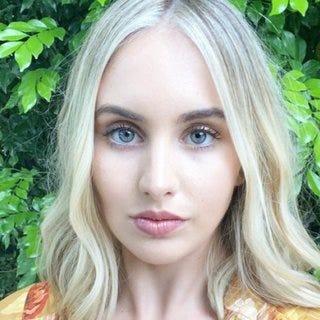

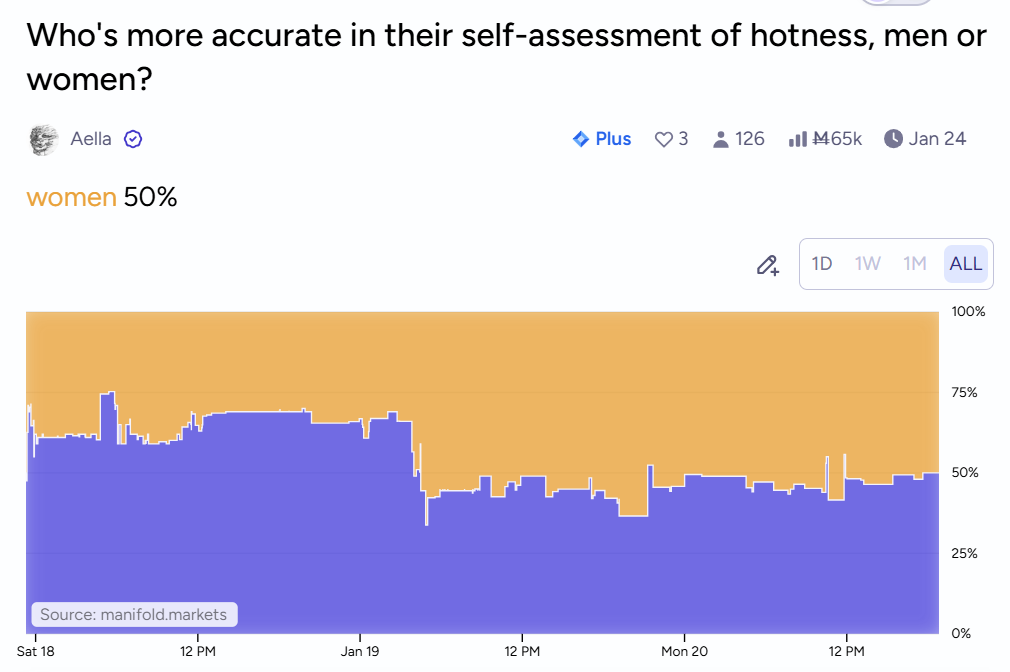
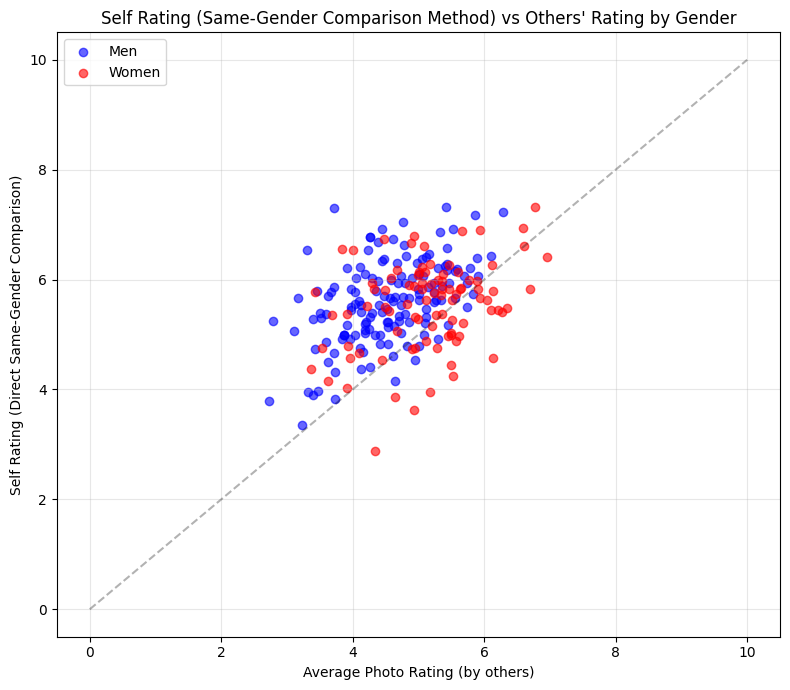
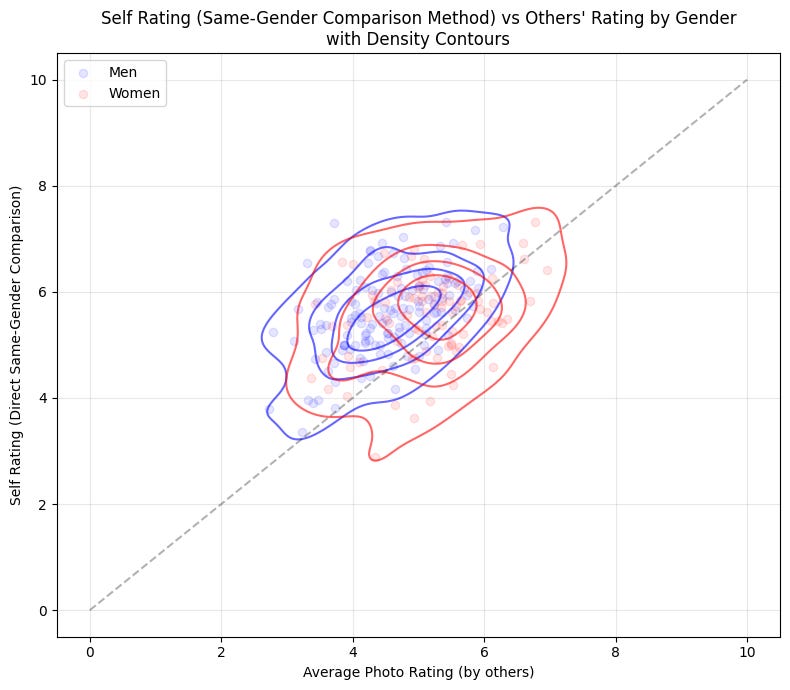

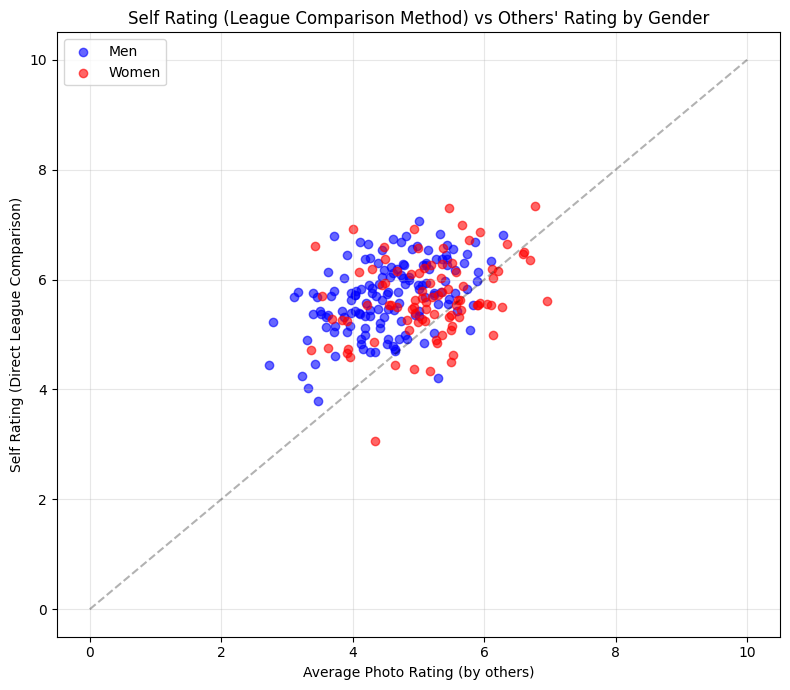

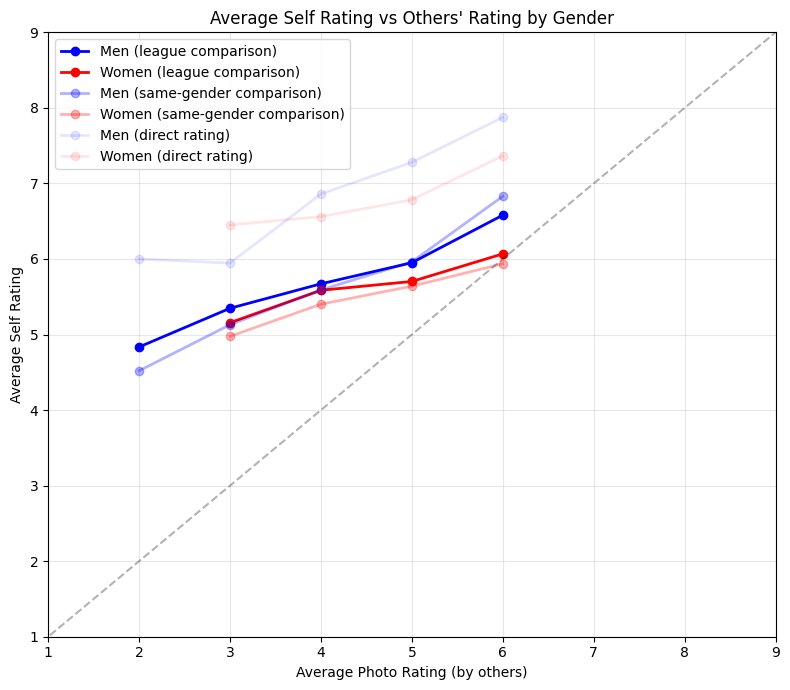


Most males are “ugly” at a first glance, without any context to who they are, my guess is because male strangers represent a potential evolutionary threat, both to men and women.
I could be wrong, but Id wager the “familiarity boost” in attractiveness is higher for men than for women. This could be tested by comparing how women would rate their close male friends and relatives and how that compares to rating from strangers.
If true, this may factor into why women rate men less attractive on average, and why men’s self rating is so off.
Something to think about is the medium of comparions: pictures. pictures may just make everyone look “ugly”, because of how impersonal they are. Even if asked to rate purely physically, People would probably rate someone lower from a picture, but a bit higher after just 5-10 minutes of interacting with them. This disparity may reflect in the higher self ratings (because everyone knows themaelves) and the lower stranger ratings (both direct and via comparison to self).
Some additional thoughts:
1. while everyone is naturally ‘delusional’, social media probably makes women more humble due to the constant comparisons.
2. men are probably wired to be over-confident in their appearance because confidence is sexy.
Have you tried incorporating variance into the analysis? Imagine someone whose average rating is 5, but who gets voted 0 by half the people and 10 by the other half. That person will get lots of enthusiastic attention, so they're (legitimately) likely to rate themselves higher than a 5.